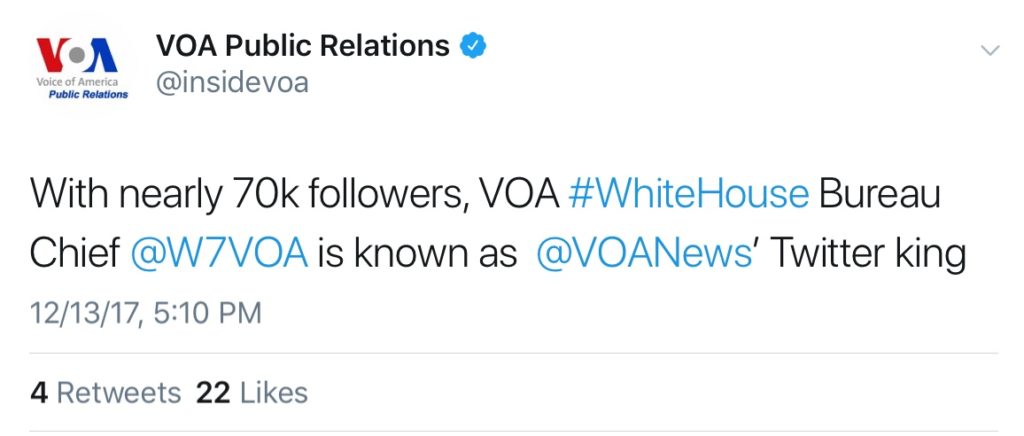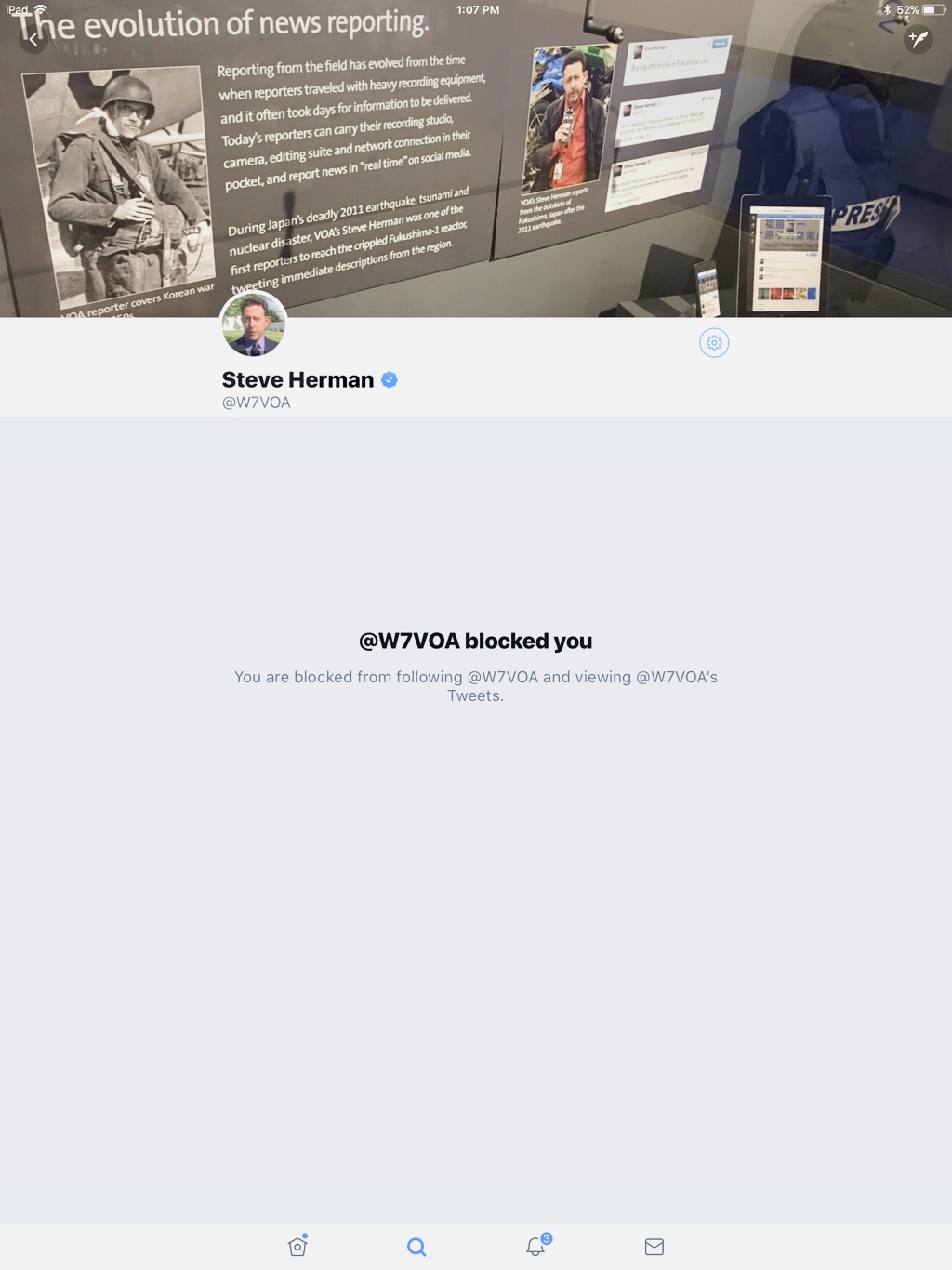BBG – USAGM Watch Guest Commentary
Secret Facebook Pages and Twitter Blockers at USAGM
By BBG – USAGM Watch Contributor
Senior VOA Reporter Was Forced to Reverse Twitter Block of Watchdog Site; Agency Operated or Sanctioned Secret Facebook Groups for Years
Part One
BBG-USAGM Watch readers are no doubt familiar with two recent stories involving social media and federal government employees — including the highest employee the American people have, the president himself.
To review, a secret Facebook group existed at least since 2016 for current and former Customs and Border Protection employees where offensive messages were posted, including comments mocking the death of a 16-year-old detained Guatemalan migrant, and bigoted remarks about Latina members of Congress.
See: “Revelations About a Secret Facebook Group Spawn Investigation of 70 Current and Former Border Patrol Employees” By Ginger Thompson. ProPublica, July 15, 2019.
A Politico report quoted a former CPB commissioner as saying that while the majority of Border Patrol agents perform difficult work in a humane manner, “it’s still no excuse” for anyone to post offensive content.
The report also said that due to “free speech protections granted civil servants, the anonymity that social media provides, and the participation of many government retirees, it wasn’t clear . . . that either the Trump administration or Facebook would be able to shut the Facebook group down or punish many of those who joined it.”
The other major story involved President Trump himself in a case brought by the Knight First Amendment Institute at Columbia University representing a group of Twitter users who Trump had blocked.
The U.S. Court of Appeals for the Second Circuit, in New York, ruled that because Mr. Trump uses Twitter to conduct government business, he cannot exclude some Americans from reading his posts — and engaging in conversations in the replies to them — because he does not like their views.
SEE: “Trump Can’t Block Critics From His Twitter Account, Appeals Court Rules” By Charlie Savage. The New York Times, March 29, 2019.
The court ruling has some special resonance where the U.S. Agency for Global Media (USAGM) and the Voice of America (VOA) are concerned because of controversies involving employees at the agency who used social media channels to voice opinions about Trump and Trump family members.
[For a refresher, see the numerous BBG Watch stories at some of the links at the end of this article).LIKE TRUMP, ONE SENIOR VOA CORRESPONDENT BLOCKED PRIVATE WATCHDOG MONITORING OF TWITTER FEED
The story that deserves recalling now involves the person holding perhaps the highest-profile job there is in the VOA news bureau network in Washington — that of White House correspondent.
In 2017, the BBG-USAGM Watch Twitter account and the personal Twitter account of one of BBG-USAGM Watch supporters were blocked by VOA chief White House correspondent Steve Herman from seeing his Twitter account.
At about the same time when the VOA Public Relations office called Herman “Twitter King,” he blocked the BBG-USAGM Watch website from following his Twitter feed.
In an inquiry to agency officials, BBG-USAGM Watch asked if management had ordered Herman to block Twitter accounts of this U.S. citizen/taxpayer-run website.
BBG-USAGM Watch noted that many of the tweets on Herman’s channel were posted by him in his official capacity as an employee of the United States Government, some during official working hours at U.S taxpayers’ expense.
Were Herman’s tweets in the public domain? Were they subject to federal record-keeping requirements? Could a BBG/VOA employee decide on his or her own whether tweets should not be seen by certain citizens? Did blocking a watchdog website advance the agency’s stated mission of supporting freedom of the press and democracy?
Clearly, Herman’s Twitter block against an American watchdog site had the effect of making domestic U.S. media journalistic investigation of a federal government agency more difficult.
Among other things, Herman had re-tweeted some tweets from other news outlets that later turned out to include inaccurate information. BBG-USAGM Watch asked whether the VOA two-source rule should also apply to tweets by its correspondents.
AGENCY FORCES REPORTER TO REMOVE BLOCK
In its response, USAGM (known then as the Broadcasting Board of Governors before the agency rebranded in 2018) said it had “determined” that Herman’s Twitter channel “was a personal account rather than an official VOA account.”
“Personal accounts and the content they contain are not directly subject to agency oversight or control since they are not government property,” an agency spokesperson said.
“Nevertheless, employees are expected to manage any personal account associated with official agency business in a professional manner consistent with general standards and practices applicable to journalists and federal employees, including VOA’s best practices guide.”
So, the agency did not outright say that it was not OK for one of its highest profile reporters to block a fellow citizen’s observation of his government work output. USAGM offered an excuse that he was doing so using a personal account.
Keep in mind, Herman never created any new separate official account to reflect nothing but his reporting for a federal agency.
Nevertheless, the agency decided it was wise to have a talk with Herman, adding that the agency’s management had not been aware “that anyone had been blocked from any personal social media accounts.”
“It was discussed with the reporter who has since lifted the blocks from his account,” said the USAGM spokesperson.
DAMAGE ALREADY DONE
But the damage had been done. An agency with a record of, putting it mildly, not doing enough to create and enforce specific guidelines regarding social media was apparently clueless that its highest profile correspondent had attempted to block an independent outside U.S. watchdog website.
The agency decided to have that conversation with the correspondent only after he was caught — because it looked bad to have one of its most visible reporters trying to exclude someone in digital space.
Here’s what Knight Institute director Jameel Jaffer said in response to the recent court ruling involving President Trump:
“The ruling will ensure that people aren’t excluded from these forums simply because of their viewpoints and that public officials don’t transform these digital spaces into echo chambers,” adding this will “help ensure the integrity and vitality of digital spaces that are increasingly important to our democracy.”
BBG-USAGM Watch reporting over the past decade uncovered numerous examples of BBG/USAGM, VOA and other agency employees violating the kind of reporting and social media guidelines that were already in force at non-government media organizations the agency likes to associate itself with.
These included use of social media channels and regular reports for advocacy and self-promotion, biased reporting, and posts of obscene material. Senior VOA managers at one point failed to uncover a fake social media account claiming to represent the head of VOA’s Persian Service and gave it legitimacy by following the alleged fake account for several years.
All of this, as well as other examples, forced VOA director Amanda Bennett to issue statements warning against biased reporting, and order agency employees to undergo bias training.
Today, the Voice of America’s Best Practices Guide cautions against “[taking] a controversial position or [making] a controversial comment online [that] can reflect poorly on you and on the agency” including “not only includes individual posts or tweets, but also posting your political affiliation or causes in your social media profile. . .in particular, retweeting or “liking” an opinion on one side of the issue or another could be seen as an endorsement from you or from VOA.”
There is this additional piece to the story involving Herman.
On July 11th, after former White House adviser Sebastian Gorka clashed in the Rose Garden with CNN contributor Brian Karen, Gorka was confronted by none other than Herman.
“If you believe in not blocking anybody, that anybody should have a fair chance, you blocked me, you blocked hundreds and hundreds of. . . .” the video (posted by Herman himself) shows him asking Gorka.
After Gorka acknowledged that he blocks whoever he wants “because they’re ass-hats” Herman asked if he should be considered an ass-hat.
After the @POTUS statement, I queried @SebGorka (former deputy assistant to @POTUS) in the @WhiteHouse Rose Garden about why he blocks so many journalists (including me) on Twitter, despite insisting that people on social media shouldn’t be blocked. Here’s what happened. pic.twitter.com/ujpztNDncb
— Steve Herman (@W7VOA) July 11, 2019
We will only note that it takes a degree of chutzpah for the same VOA reporter who himself had carried out a Twitter block — before being taken to the woodshed by his managers — to challenge someone else on this issue.
Earlier Herman even took time to explain the subtle difference between blocking and suspending someone’s Twitter account.
Fact check: @RealJamesWoods has not been “banned” by #Twitter. But his account has been suspended at least twice for what the social media platform deemed was abusive behavior. https://t.co/WcLTGpaH02
— Steve Herman (@W7VOA) May 4, 2019
Of course, it’s likely that few followers of Herman on Twitter were aware of his attempt to block an independent watchdog site.
I feel this is important history for our readers to know.
Read About Secret Facebook Pages of VOA Director in Part II
The author of this guest commentary, who is both as a reporter and a commentator, does not wish to be identified out of concern for protecting news sources. The author is solely responsible for all personal opinions and reporting for this article.


